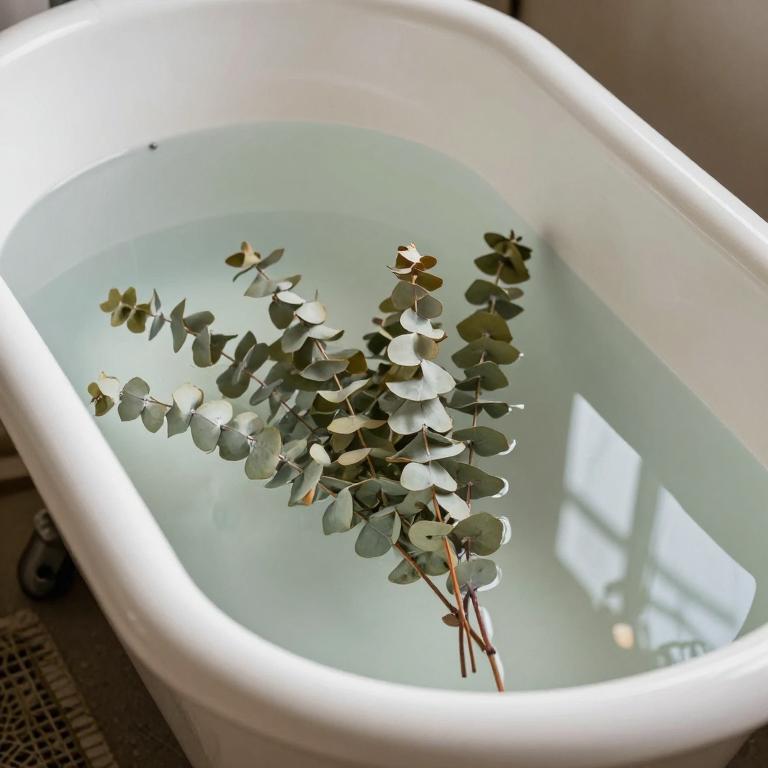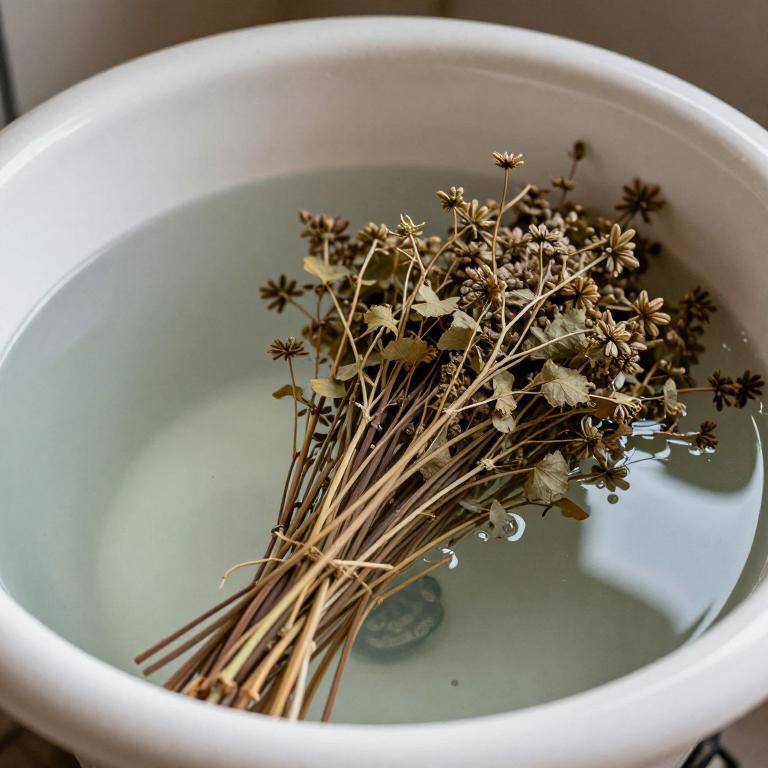10 Best Herbal Baths For Post Nasal Drip

Herbal baths can be a soothing and natural remedy for alleviating symptoms of post nasal drip by promoting respiratory comfort and reducing inflammation.
Certain herbs, such as eucalyptus, peppermint, and lavender, are known for their decongestant and calming properties when used in bath water. Adding a few drops of essential oils or a handful of dried herbs to warm water can help open up airways and ease the feeling of congestion. The steam from the bath helps to moisturize the nasal passages and thin mucus, making it easier to clear.
While herbal baths are generally safe, it's important to consult with a healthcare provider, especially if you have sensitive skin or underlying health conditions.
Table of Contents
- 1. Eucalyptus (Eucalyptus globulus)
- 2. Thyme (Thymus vulgaris)
- 3. Rosemary (Rosmarinus officinalis)
- 4. Salvia (Salvia officinalis)
- 5. Peppermint (Mentha piperita)
- 6. English lavender (Lavandula angustifolia)
- 7. Stinging nettle (Urtica dioica)
- 8. Ginger (Zingiber officinale)
- 9. St. john's wort (Hypericum perforatum)
- 10. Parsley (Petroselinum crispum)
1. Eucalyptus (Eucalyptus globulus)

Eucalyptus globulus, commonly known as eucalyptus oil, is often used in herbal baths to alleviate symptoms of post nasal drip due to its antimicrobial and anti-inflammatory properties.
When added to warm water, the essential oil helps to open up nasal passages and reduce congestion by stimulating the body's natural drainage processes. The aromatic compounds in eucalyptus oil can also promote relaxation and ease breathing, making it a soothing addition to a bath routine. However, it is important to dilute the oil properly with a carrier oil to avoid skin irritation.
While herbal baths can provide symptomatic relief, they should not replace medical treatment for persistent or severe post nasal drip.
2. Thyme (Thymus vulgaris)

Thymus vulgaris, commonly known as thyme, has been traditionally used in herbal baths to support respiratory health, including the relief of post nasal drip.
The essential oils in thyme, particularly thymol, possess antimicrobial and anti-inflammatory properties that may help reduce mucus buildup and soothe irritated nasal passages. When used in a warm bath, thyme can promote relaxation and ease congestion, offering a natural approach to managing symptoms. However, it is important to dilute thyme essential oil properly to avoid skin irritation, as it is highly concentrated.
While herbal baths may provide symptomatic relief, they should not replace professional medical advice for persistent or severe post nasal drip.
3. Rosemary (Rosmarinus officinalis)

Rosmarinus officinalis, commonly known as rosemary, is a fragrant herb that has been traditionally used for its therapeutic properties, including its potential benefits for respiratory health.
When used in herbal baths, rosemary can help alleviate symptoms of post nasal drip by promoting circulation and reducing inflammation in the nasal passages. The essential oils found in rosemary, such as camphor and pinene, have antimicrobial and decongestant properties that may support respiratory wellness. To prepare a rosemary herbal bath, simply steep fresh or dried rosemary in hot water and use the infused water as a base for a warm bath.
Incorporating rosemary into a regular bathing routine can offer a soothing and natural remedy for those experiencing persistent post nasal drip.
4. Salvia (Salvia officinalis)

Salvia officinalis, commonly known as sage, has been traditionally used in herbal baths to alleviate symptoms of post-nasal drip due to its antimicrobial and anti-inflammatory properties.
When infused into bath water, sage can help soothe irritated nasal passages and reduce mucus production, providing relief from congestion. The aromatic compounds in sage also promote relaxation and may help ease breathing by opening up the airways. A warm sage bath can be particularly beneficial for individuals experiencing chronic or persistent post-nasal drip, offering a natural and soothing alternative to conventional treatments.
However, it is important to consult with a healthcare professional before using sage baths, especially for those with sensitive skin or underlying health conditions.
5. Peppermint (Mentha piperita)

Mentha piperita, commonly known as peppermint, has been traditionally used in herbal baths to alleviate symptoms of post nasal drip.
The cooling and decongestant properties of peppermint oil can help reduce inflammation in the nasal passages and ease breathing. When added to warm water, peppermint oil can create a soothing bath that promotes relaxation and supports respiratory comfort. This natural remedy is particularly beneficial for individuals seeking a non-pharmacological approach to managing post nasal drip.
However, it is important to dilute the essential oil properly to avoid skin irritation and consult with a healthcare provider before use, especially for those with sensitive skin or underlying health conditions.
6. English lavender (Lavandula angustifolia)

Lavandula angustifolia, commonly known as English lavender, has been traditionally used for its soothing and anti-inflammatory properties, making it a valuable ingredient in herbal baths for post nasal drip.
When infused into bathwater, lavender helps to reduce nasal congestion and soothe irritated mucous membranes, offering relief from the discomfort associated with post nasal drip. The calming aroma of lavender also promotes relaxation and can help ease the stress often linked to chronic respiratory issues. A warm lavender bath can improve circulation and support the body's natural healing processes, potentially reducing inflammation in the nasal passages.
Incorporating lavender into a regular bathing routine may serve as a natural and holistic complement to conventional treatments for post nasal drip.
7. Stinging nettle (Urtica dioica)

Urtica dioica, commonly known as stinging nettle, has been traditionally used in herbal baths to alleviate symptoms of post nasal drip due to its anti-inflammatory and decongestant properties.
When infused into bath water, the compounds in stinging nettle can help reduce mucus production and soothe irritated nasal passages. The warmth of the bath enhances the absorption of these beneficial compounds through the skin, promoting overall respiratory relief. Regular use of stinging nettle baths may support immune function and reduce the frequency of post nasal drip episodes.
However, it is advisable to consult a healthcare professional before incorporating this remedy, especially for those with sensitive skin or existing medical conditions.
8. Ginger (Zingiber officinale)

Zingiber officinale, commonly known as ginger, has been traditionally used for its anti-inflammatory and decongestant properties, making it a popular choice for herbal baths aimed at alleviating post-nasal drip.
When incorporated into a warm bath, ginger's active compounds, such as gingerol and shogaol, can help reduce mucus production and soothe irritated nasal passages. The aromatic steam from the bath may also help open up airways and ease breathing, providing relief from congestion. To prepare a ginger bath, fresh ginger root can be sliced and added to the water, or a ginger essential oil can be diluted and added to the bath for a more concentrated effect.
While herbal baths can offer natural relief, they should be used in conjunction with other medical treatments recommended by a healthcare professional for persistent post-nasal drip.
9. St. john's wort (Hypericum perforatum)

Hypericum perforatum, commonly known as St. John's Wort, has been traditionally used for its anti-inflammatory and antiseptic properties, making it a potential candidate for herbal baths aimed at alleviating symptoms of post-nasal drip.
When infused into bath water, the essential oils and active compounds in St. John's Wort may help reduce inflammation in the upper respiratory tract and ease the discomfort associated with excess mucus drainage. This herbal bath can promote relaxation and may indirectly support the body's natural healing processes by reducing stress, which is often linked to worsening respiratory symptoms. However, it is important to note that while some individuals may find relief from this remedy, it should not replace professional medical advice, especially if post-nasal drip is caused by an underlying condition such as allergies or infections.
As with any herbal treatment, it is advisable to consult with a healthcare provider before use, particularly for those taking medications that may interact with St. John's Wort.
10. Parsley (Petroselinum crispum)

Petroselinum crispum, commonly known as parsley, has been traditionally used in herbal baths to support respiratory health, including relief from post nasal drip.
The essential oils in parsley, particularly apiol and limonene, possess mild antiseptic and decongestant properties that may help reduce mucus buildup and soothe irritated nasal passages. When infused into bath water, the aromatic compounds can be inhaled, offering a calming and cleansing effect on the respiratory system. Herbal baths with parsley are often recommended as a complementary therapy to alleviate symptoms of post nasal drip, especially when combined with other natural remedies.
However, it is important to consult with a healthcare professional before using herbal baths, especially for individuals with sensitive skin or existing medical conditions.